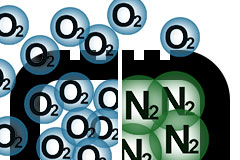Why Nitrogen-Filled Tires Are Good for Your Car - Vol.375
A growing number of car owners are opting to equip their cars with nitrogen-filled tires instead of air-filled ones. You may have seen nitrogen tires, as they are usually marked with green valve caps. What is it that makes people decide to use them? Well, here is the answer.

Why Oxygen and Water Are Bad for Your Tires
You already know that the standard car tire is filled with air. Air is a mixture of several different gasses: nitrogen (78%), oxygen (21%), water vapor, CO2, and traces of noble gasses. But it turns out that air isn't ideal for tires.
While oxygen is essential to us humans, science has proven that it is the enemy of anything made of steel or rubber, including your car wheels. Where there is oxygen, there is also oxidation. This means that over time, oxygen will bring about rust, rot, and corrosion, resulting in permanent damage to your car.
Because of its structure, oxygen travels through tire rubber easily, resulting in unstable tire pressure. When mixed with water, even in the form of vapor, it can cause changes in tire pressure based on weather conditions. These variations in pressure values lead to deterioration of your tires and wheels.
What Makes Nitrogen Good for Your Tires
Nitrogen has larger molecules than oxygen, which makes it more difficult to migrate through your tires. This results in better retention of tire pressure. Because nitrogen is not combustible or corrosive, the pressure will not fluctuate under the impact of temperature swings as much as it does in air-filled tires.
Older cars have wheels that are prone to rust and rot, but that does not occur with nitrogen. Inconsistent tire pressure causes the vehicle to burn more fuel than it should, which is another thing you need not worry about if you are using nitrogen-filled tires.
Of course, your own safety and the safety of your passengers should always come first. By filling your tires with nitrogen, you are reducing the risk of accidents on the road as a high percentage of blowouts is caused by underinflated tires.
Why Nitrogen Is a Smart Investment
Different sellers produce different types of nitrogen filling for your tires - as the purity increases, so does the price. Research has shown that you can get all the benefits of nitrogen with the purity of anywhere between 93 and 98 percent, which qualifies as high on the purity scale.
Some gas stations and car dealerships offer free nitrogen, but if you are unable to locate any of them, chances are you will spend about $90 per year on nitrogen filling. However, consider this a smart investment. In the long run, using nitrogen to fill your tires instead of compressed air will save you money on fuel and tire maintenance. Additionally, you are also investing in increased road safety.
Who Else Uses Nitrogen-Filled Tires
Race car drivers were among the early adopters of nitrogen-filled tires because Nitrogen helps them predict tire pressure fluctuation more accurately. Higher nitrogen levels also help eliminate the explosive properties of oxygen in tires, reducing the risk of a car ending up in flames following a race track accident.
Nitrogen is also utilized by commercial airlines, and this particular use is even regulated by the U.S. law. It is intended to stop water vapor from freezing when the plane reaches higher altitudes. Some airplane manufacturers even add nitrogen to their gas systems for its noncombustible qualities. Lastly, nitrogen is used by NASA and the U.S. military for its efficiency and inert properties. So yes, nitrogen's pretty good.